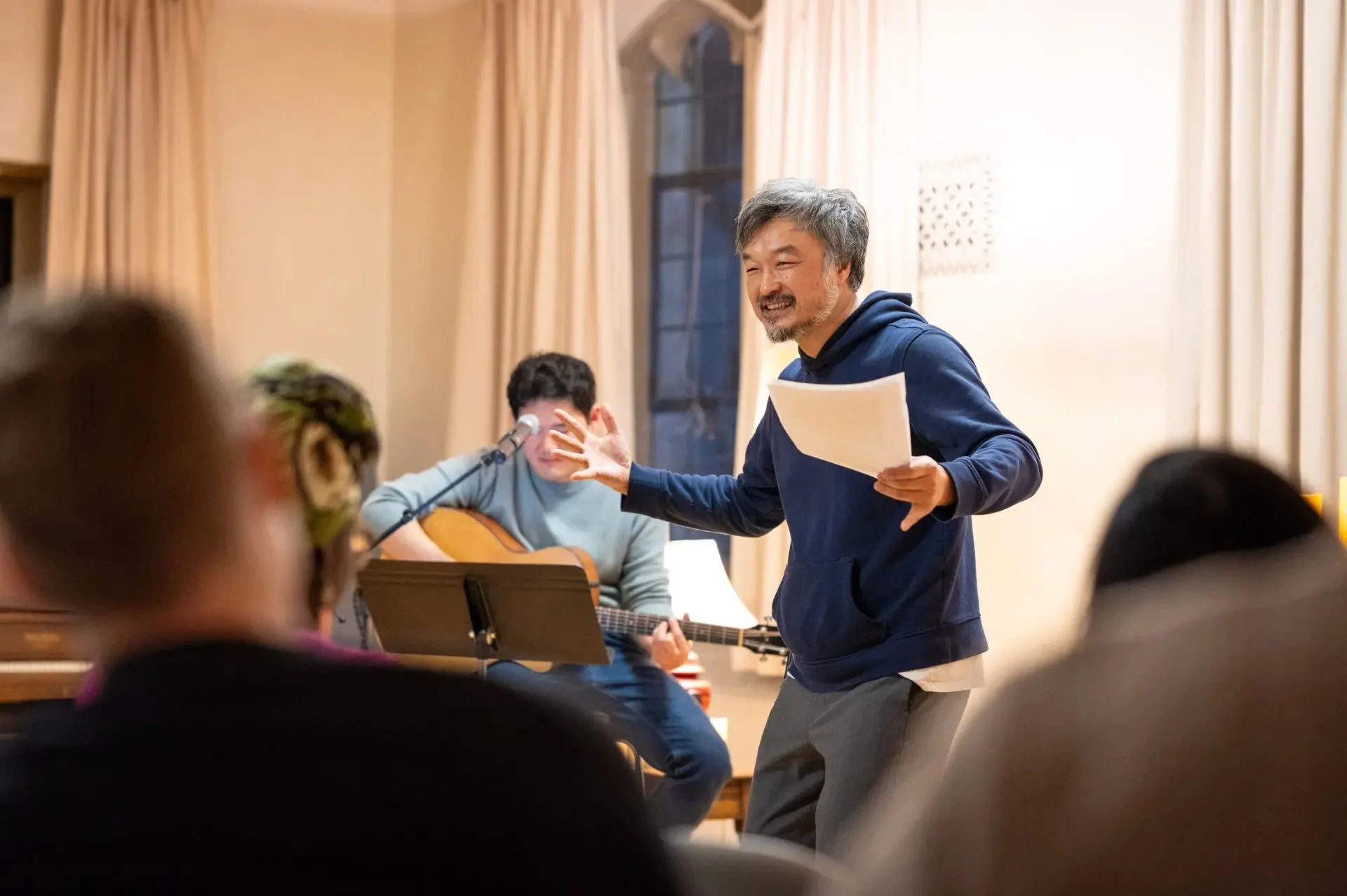Ins Choi's song-filled Son of a Preacherman explores faith in a changing world
Like his perennial hit Kim’s Convenience, new work by the acclaimed writer and actor reflects on Asian Canadian identity with fearless humour
Ins Choi: Son of a Preacherman. Photo by Henry Vanderspek
Pacific Theatre presents Ins Choi: Son of a Preacherman from April 2 to 13
COMING RIGHT OFF an extended production of Kim’s Convenience with Toronto’s Soulpepper Theatre, Canadian writer and actor Ins Choi is gearing up for a new show featuring songs and stories as the son of a head pastor.
On April 2, Ins Choi: Son of a Preacherman is set to have its world premiere at Vancouver’s Pacific Theatre, in collaboration with director Kaitlin Williams and backed by a live band featuring musician-actors Ben Elliott, Rachel Angco, and Haneul Yi. Inspired by songs, monologues, and writings he has collected over the years, the show chronicles Choi’s experiences at the intersections of faith and his Korean-Canadian identity.
“My dad is a preacher,” Choi explains over a Zoom call from Toronto. “Now he’s retired, but he was a preacher of a Korean church in Toronto for his whole life. My grandfather was a preacher in Korea. I have uncles and aunts and cousins who are preachers. It’s a big, preaching, Holy family. I just write stories when I get inspired, and some stories are fictional, some stories are based on my life.”
Born in South Korea and raised in Toronto, Choi is famously known as the creator of Kim’s Convenience, a story inspired by his formative years working at his uncle’s convenience store. What began as a love letter to first-generation immigrants was eventually adapted into a groundbreaking CBC television sitcom. Years after the television finale, interest in the stage production remains ever present, with Choi joining the show’s premiere European production just last year.
“It’s been a bit of a whirlwind,” he admits. “It began with me taking on the role of Appa last year at the Park Theatre in London. It’s been so wonderful to return to theatre, return to acting, and it’s my first love. It’s been a full-circle moment. I originated the role of Jung [Appa’s son], and now I’m playing Appa and loving it.”
Now embodying a longer view of life, like Appa, Choi has witnessed progress in the theatre industry, but recognizes there’s still work to be done when it comes to Asian representation on-stage.
“I feel like it’s still rare for Asians to be on-stage, so people love it because it’s still refreshing,” Choi says. “Unfortunately, things haven’t progressed as quickly as I would have liked, but I’m so happy to see, you know, Cambodian Rock Band at the Arts Club Theatre Company, Burning Mom by Mieko Ouchi at the Arts Club, Derek Chan with A Taste of Hong Kong. There’s so much happening in terms of Asian theatre creators, both in Toronto and also in Vancouver. I’m going to see all these shows while I’m there, hopefully.”
Choi’s advocacy for Asian voices goes back to his roots as an artist. Before Kim’s Convenience made its debut at the 2011 Toronto Fringe and met with success, he struggled to find roles as an East Asian actor. After he graduated from York University’s theatre program, it was the Asian theatre community in particular that kept his creative spark alive in the face of immense limitations, and ultimately motivated him to begin creating his own materials.
“A place like [Vancouver Asian Canadian Theatre] is a great training ground for artists who come out of theatre school, or wherever they’re coming from, to whet their appetite,” Choi says.
“When I was in acting school, I was the only non-white actor in the class. Everyone was supportive, but that was the reality. It wasn’t until I found myself in the community of fu-GEN Asian Canadian Theatre Company in Toronto, surrounded by all these other artists who look like me, where I felt like ‘Oh, this is different. There is more meaning here. There’s an understanding here.’ It feels more like home than theatre school, and I think it’s important to provide programs for younger Asian artists to experiment, to fail, to try, and figure themselves out.”
With Son of a Preacherman, Choi brings a taste of home—and humour—to the stage once again. From tales of his grandfather trying to get rid of a family curse to musings on his search for Asian role models, Choi’s stories and songs illustrate the dynamic range and contradictions of a second-generation immigrant. Despite his comedic lens and musical interludes, Choi doesn’t shy away from uncomfortable topics—whether it’s the pressures of growing up in a devout household or questioning faith in a shifting world.
“I don’t censor myself,” he says. “I just feel like, when I hear good stand-up comics talk about some of the dark areas in their life that they transform into something funny and palatable for an audience, they’re doing everyone a service. They lived through something dark and they’re sharing it with us so that we can, at once, maybe appreciate where they are coming from, but also feel like we’re not alone.” ![]()
























